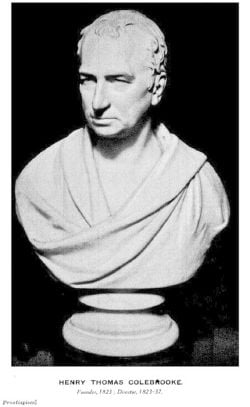Henry Thomas Colebrooke
{{#invoke:Message box|ambox}}
| Henry Thomas Colebrooke | |
 A bust of Henry Thomas Colebrooke currently owned by the Royal Asiatic Society
| |
| Born | June 15 1756 London, England |
|---|---|
| Died | April 10 1837 (aged 80) London, England |
| Nationality | British |
| Occupation | Orientalist |
| Known for | Sanskrit scholar, one of the founders of the Royal Asiatic Society |
Henry Thomas Colebrooke (June 15, 1765 - March 10, 1837) was an English orientalist.
Biography
Henry Thomas Colebrooke, third son of Sir George Colebrooke, a Second Baronet, was born in London. He was educated at home; and when only fifteen he had made considerable attainments in classics and mathematics. From the age of twelve to sixteen he resided in France.
In 1782 was appointed to a writership in India. About a year after his arrival there he was placed in the board of accounts in Calcutta; and three years later he was removed to a situation in the revenue department at Tirhut. In 1789 he was removed to Purneah, where he investigated the resources of that part of the country, and published his Remarks on the Husbandry and Commerce of Bengal, privately printed in 1795, in which he advocated free trade between Great Britain and India.
After eleven years' residence in India, Colebrooke began the study of the Sanskrit language; and to him was confided the translation of the great Digest of Hindu Laws, a monumental study of Hindu law which had been left unfinished by Sir William Jones. He translated the two treatises, the Mitacshara of Vijnaneshwara and the Dayabhaga of Jimutavahana, under the title Law of Inheritance. He was sent to Nagpur in 1799 on a special mission, and on his return was made a judge of the new court of appeal, over which he afterwards presided.
In 1805, Lord Wellesley appointed him professor of Hindu law and Sanskrit at the college of Fort William. During his residence at Calcutta he wrote his Sanskrit Grammar (1805), some papers on the religious ceremonies of the Hindus, and his Essay on the Vedas (1805), for a long time the standard work in English on the subject. He became member of council in 1807 and returned to England seven years later.
He was a director of the Royal Asiatic Society, and many of the most valuable papers in the society's Transactions were communicated by him.
A posthumous essay on his father's life was published by Sir T.E. Colebrooke in 1873 as part of a reprinting of Miscellaneous Essays.
Works
- Henry Thomas Colebrooke, ed. (1807). Kosha, Or Dictionary of the Sanscrit Language by Umura Singha with an English Interpretation and Annotations by H.T. Colebrooke. (3rd edition, 1891). Calcutta: Haragobinda Rakshit.— A scanned copy of the 3rd edition of this rare book has been made available online from the library of the University of Michigan, digitized September 7, 2006 — click here to read the original text
- Henry Thomas Colebrooke. (1837). Miscellaneous Essays. London: W.H. Allen & Company.— A scanned copy of this rare book has been made available online from the library of Harvard University, digitized August 12, 2005 — click here to read the original text
- Henry Thomas Colebrooke. (1858). On the Religion and Philosophy of the Hindus. London: Williams & Norgate.— A scanned copy of this rare book has been made available online from the library of Harvard University, digitized November 13, 2006 — click here to read the original text
Template:Botanist
ReferencesISBN links support NWE through referral fees
Notes
Further reading
- Buckland, C. E., ed. (1906). "Colebrooke, Henry Thomas" in Dictionary of Indian Biography. London: Swan Sonnenschein & Company.— A scanned copy of this rare book has been made available online from the library of Harvard University, digitized July 8, 2005 — click here to read the original text
- Higgenbothom, J.J. (1874). "Colebrooke, Henry Thomas" in Men Whom India Has Known: Biographies of Eminent Indian Characters. Madras: Higgenbothom & Company.— A scanned copy of this rare book has been made available online from the New York Public Library, digitized September 12, 2005 — click here to read the original text
- Colebrooke, Thomas E. (1873). "Life of Colebrooke" in Frederick Max Müller's Chips from a German Woodshop, (1875). Vol. IV, pp. 377-317. London: Longmans, Green & Company.— A scanned copy of this rare book has been made available online from the library of Harvard University, digitized July 21, 2005 — click here to read the original text
This article incorporates text from the Encyclopædia Britannica Eleventh Edition, a publication now in the public domain. de:Henry Thomas Colebrooke es:Henry Thomas Colebrooke fr:Henry Thomas Colebrooke pt:Henry Thomas Colebrooke sv:Henry Thomas Colebrooke
Credits
New World Encyclopedia writers and editors rewrote and completed the Wikipedia article in accordance with New World Encyclopedia standards. This article abides by terms of the Creative Commons CC-by-sa 3.0 License (CC-by-sa), which may be used and disseminated with proper attribution. Credit is due under the terms of this license that can reference both the New World Encyclopedia contributors and the selfless volunteer contributors of the Wikimedia Foundation. To cite this article click here for a list of acceptable citing formats.The history of earlier contributions by wikipedians is accessible to researchers here:
The history of this article since it was imported to New World Encyclopedia:
Note: Some restrictions may apply to use of individual images which are separately licensed.